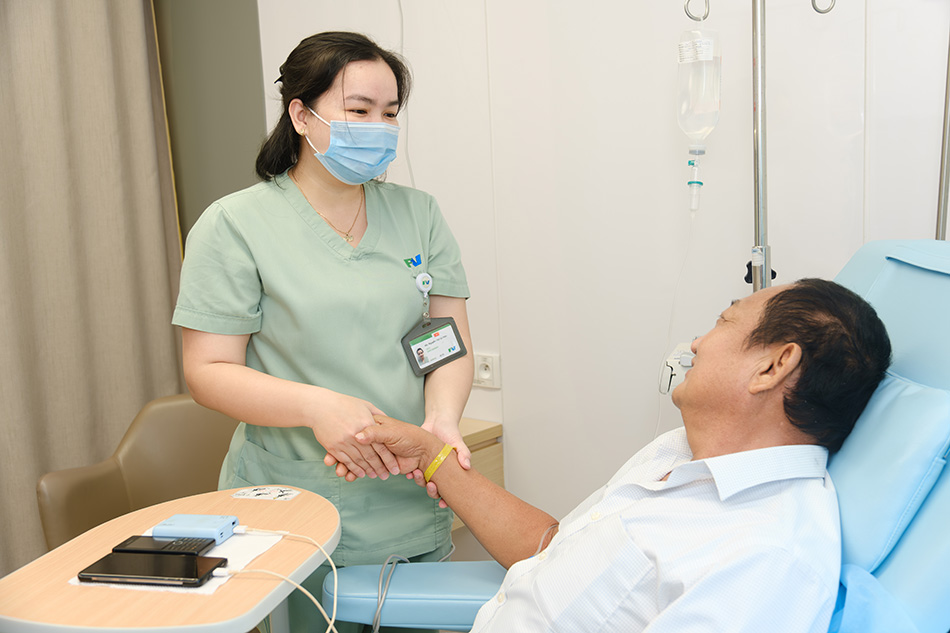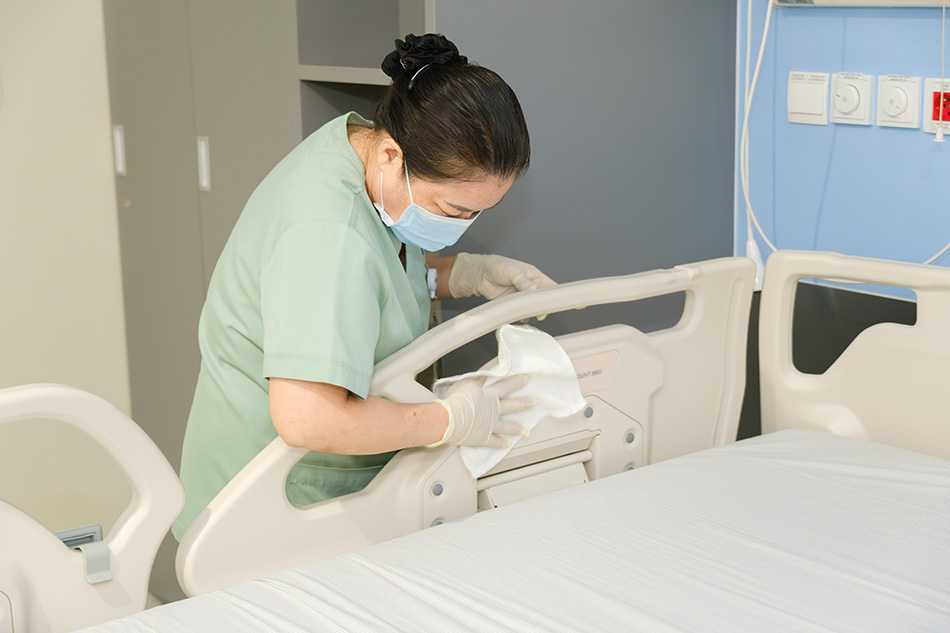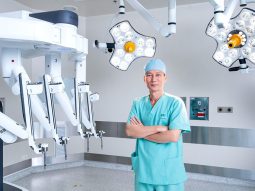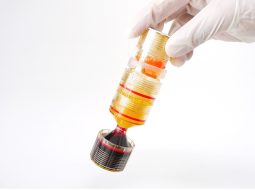Facing cancer is not the end of life. However, entering treatment is a daunting journey that they may falter to calm and strong from the beginning. Who will hold the hands of these anxiety filled patients from the beginning and throughout the lengthy treatment process? Family is crucial, doctors are essential, but often, the care assistants and nurses who stay with patients daily are the miraculous helping hands.
Be patient with absurdity
The scene at the chemotherapy ward is a blend of both hustle and tranquillity. It is paradoxical to think that this place treats cancer, as it’s often noted to be one of the most beautiful spaces at FV. This setting helps ease patients’ minds, but it does not make the work of nurses and care assistants less challenging.
A few years ago, Ms Hien (Chemotherapy Ward – Care Assistant) recalls the heavy-laden eyes of an elderly female patient. A gentle touch and a few comforting words from Ms Hien only seemed to deepen her confusion and fear. The patient was not afraid of the cancer she had; she feared it would spread to the young care assistant. For months ago, the woman had been “isolated” by her family, left to manage on her own and come to the hospital alone, under the mistaken belief that cancer could be contagious.

“Ms Hien (green uniform) often takes the time to listen to patients tell their stories.
“I was very taken aback. I patiently reassured her that everyone here would always be by her side and no one was afraid of catching the disease. At the same time, I informed the doctors to resolve the misunderstanding with her family,” Ms Hien shared. After a period of time, reconnecting with her loved ones and the heartfelt conversations with the nurses and care assistants became the “medicine” that helped this patient overcome the dreadful disease.
Similarly, Ms Chinh (Care Assistant – Medical East Ward) recalled that she recently formed a bond with another elderly female patient. This cancer patient was perpetually anxious about the treatment. “I talked with her a lot. I said, ‘If I had any peace to give, I would give it all to you.’ That helped her feel more at ease.” Overcoming a severe illness sometimes requires the expertise of doctors, but often it starts with the sincere words of a care assistant.

Nurses and care assistants are the most effective communication bridges between patients and doctor
These are just small fragments of the larger picture, but they are enough to see that cancer patients often face not only physical pain but also psychological crises, which can be the most devastating blows. Patients express their emotions in various ways – through tears, screaming, destructive behaviour, and sometimes, through profound silence.
Ms Hoa Van (Medical East Ward), who has smiling eyes but often speaks of patient’s sorrows with a voice tinged with emotion and eyes brimming with tears. To her, the unreasonable behaviour, outbursts of emotion, and the patient’s harsh words and actions all have their reasons. Her job is to patiently help them find peace.
For Mr Chien, a cancer patient with “9 years of experience” at the Hy Vong Cancer Care Centre, the care assistants who look after cancer patients have remarkable endurance. Some days in the chemotherapy ward, observing the other patients, listening to their complaints and frustrations, he feels even more appreciative of the care assistants’ patience. “Everyone works for a salary, but without sincerity and kindness, they wouldn’t be able to do this job,” he said.

Mr Chien believes that the care assistants’ kindness also helps him feel more at ease
Mr Chien, a military veteran, believes that no battlefield can be faced without comrades. Thus, in his many years of battling cancer, he always cherished the “symbiotic handshake” with his family, doctors, and those closest to him – the care assistants. Likewise, the care assistants are not only providing support and care for cancer patients but also as being their friend. The handshakes, the looks, and sometimes hours spent listening to their stories during the most challenging moments might not be a cure, they are a miracle.
Silently Easing the Pain of Farewells
Almost all the care assistants we met who care for cancer patients shook their heads when asked if they would choose a different job or specialty. Even though their daily work is not easy, both physically and mentally. Sometimes, life may be lighter when thinking, “if I can’t do it, just let it go.” However, by dedicating themselves with devotion and following their compassion, the care assistants in the oncology department know they will face heavy pressures.
Ms Hoa Van shared through hesitant tears, “Many patients, until the end of their lives, do not want to believe they are ill. In those moments, I feel a deep sense of helplessness in this job.” Such feelings, as described by Ms Hoa Van, unfortunately, are a daily story for healthcare workers.

Sometimes, cleaning empty hospital beds is a psychological burden
The care assistants all told us that they really enjoyed the short film the hospital made recently, especially the interactions between patients and care assistants depicted in the film. “In real life, it’s even more dramatic,” they laughed. Stories of uncooperative patients who throw objects and scold them, and dealing with uncooperative patients were told with a kind smile is a routine part of their job. However, after a night of caring, the patient could no longer fight the disease. The usual frustrations directed at them ceased, though the memory of the previous day lingered, leaving an indescribable sense of emptiness.
For the care assistants, each patient, whether gruff or amiable, feels like a family member. There are times like yesterday when a “family member” wanted Ms Chinh to adjust the temperature of a glass of water four or five times in one night; or the day before, when a “family member” was hallucinating (caused by the chemotherapy process) asked Ms Hien to catch hundreds of imaginary insects on the wall to soothe their sleep; or the moments when a “family member” squeezed Ms Van’s hand to ask the doctor to let them go home in their final days. On such days, whether through a caring smile as part of their paid work or through tears of empathy, the care assistants perform their duties with full dedication and kindness.

The care assistants are also companions to the patients.
Many patients at FV Hospital, despite their condition, have wanted to extend their stay because “it’s so comfortable here.” Mr Chien remembers a morning when he arrived for treatment, and a care assistant exclaimed, “Are you back again?” The slightly teasing remark didn’t sadden him; instead, it warmed his heart, feeling remembered and cared for by everyone. “If there were any gift as beautiful as a thousand roses, I think that would truly be fitting to dedicate to their care for me.”
Care assistants like Ms Chinh, Ms Van, or Ms Hien, though not called “white angels,” are indeed rays of joy. Quietly and unassumingly, their gentle light may be the hope in the darkest moments for many cancer patients.
| To cope with the pressures of their work, the care assistants often seek support from their families and colleagues. These significant sources of emotional support, fortunately, understand the nature of their work, and to some extent, transform their endless thoughts into a more resilient motivation for the days ahead. Ms Phan Thi Thu Van (Head Nurse – Medical East Ward) mentioned that within their team, nurses and care assistants often engage in conversations and provide comfort to alleviate the tensions and anxieties of their work. “In the long run, I believe it will be necessary to establish specialised programmes to help staff address their mental health after such pressures.” Ms. Thu Van said. |

 Vi
Vi 












